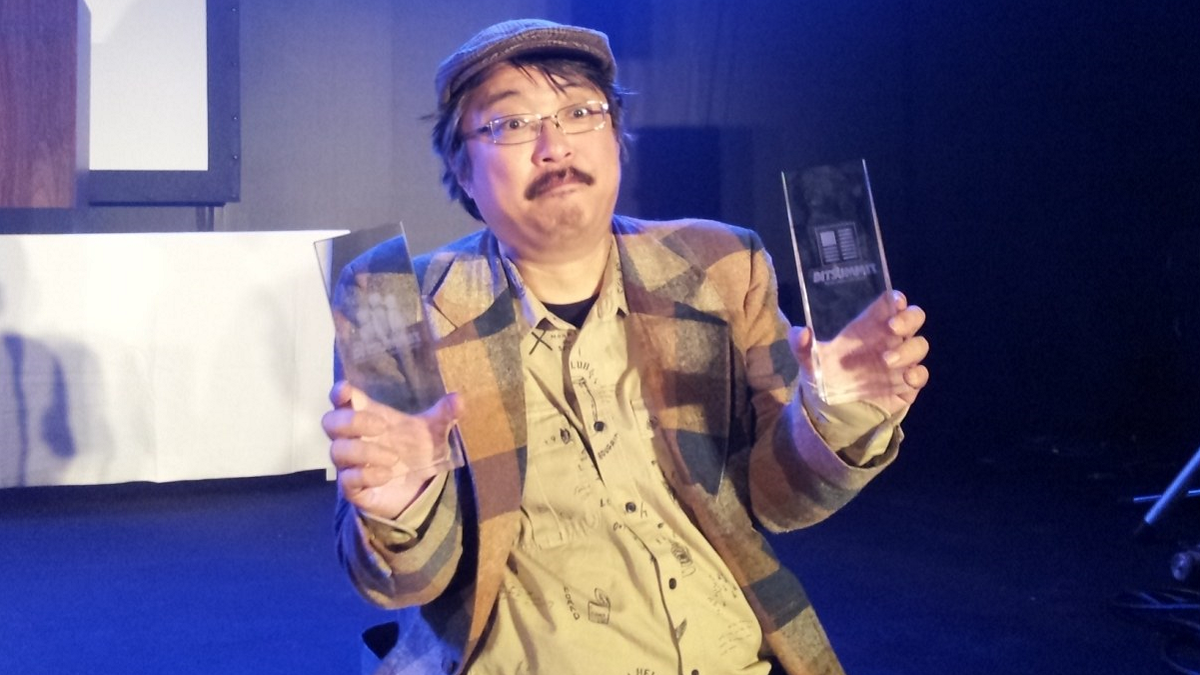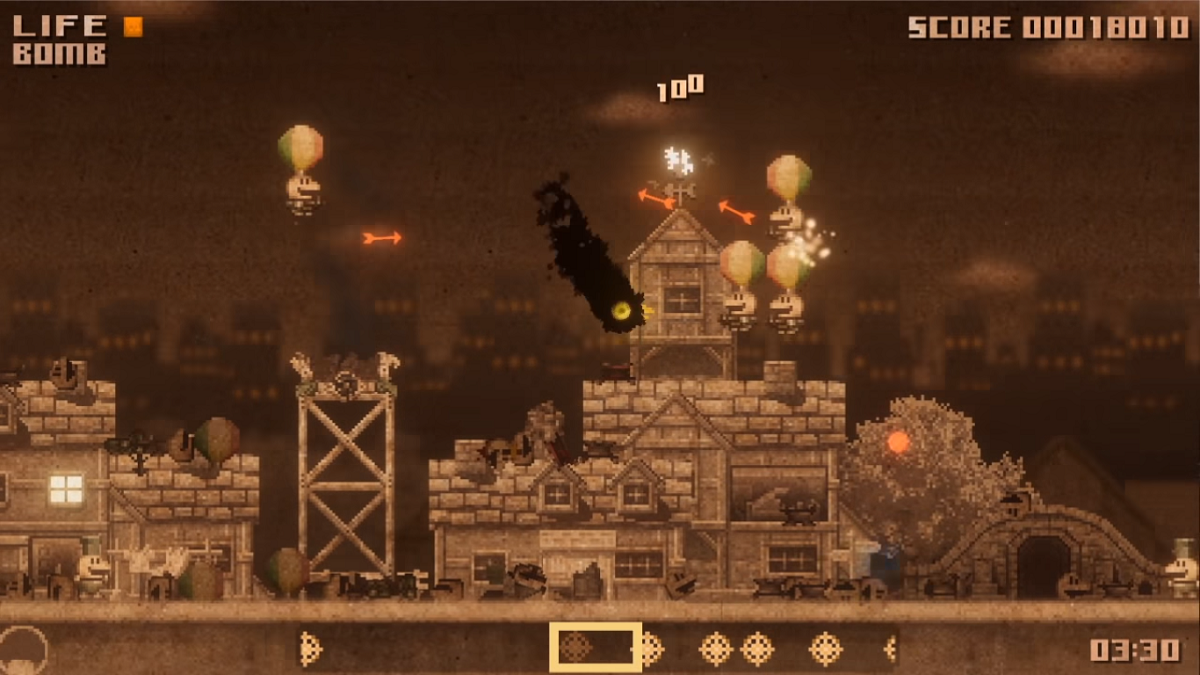Love & Peace: Interview with Yoshiro Kimura, Part Two
“I’m in my dream, thinking about games.”

Image originally taken by Daniel Feit for the article “Inside Japan’s Indie Games Fest, Where Crazy is Mandatory“
In the second half of our interview with Onion Games’ Yoshiro Kimura, we spoke about his unique creative process, the uncertainty of the Japanese indie scene and his desire to make another roleplaying game. Make sure to check out part one of our interview with Kimura for more information on his upcoming, Black Bird.
TIGW: Last year you did an interview with TouchArcade’s Shaun Musgrave-
Yoshiro Kimura: You read ALL!
[Laughter] I do my research! You mentioned sometimes your ideas can come when you’re perfectly happy walking down the street, while other times they come when life is really difficult, and you use that frustration to fuel your ideas. Which of the two was Black Bird born out of?
I can’t remember!
[Kimura thought about it for a while]
The first impression came in 2013… maybe. While I was making Million Onion Hotel, and suddenly – “Aah! Good idea!” and I just began drawing, and then I made Kurashima-san draw the characters and buildings.
I was… [Kimura thinks again] I was walking down the road, after all! Walking down the road in Shinjuku.
I think the way ideas can just come out of nowhere like that is interesting.
Why is it interesting? Everyone is the same, fundamentally.
Well, yeah – I mean the idea that, for everyone, you can just be walking and out of nowhere, *snap* “Ah! A good idea!”
Aah. Y’know, fundamentally, I am thinking continuously, forever and ever. For example, when we finish this interview and I walk from here to the Black Bird booth, I cannot concentrate on just walking – I’m also living in another world. I’m in my dream, thinking about games. Every moment, every time, I… it’s… this is also like a curse.
Something I often say is “making games is a curse”. Someone is forcing me to think about new worlds, to make new stories – “someone” could be God, or nature – I don’t know.
Do you ever grow tired of it? You say that it’s a curse, which makes it sound like it’s a bad thing.
Don’t you think there are good and bad things about making games? Sometimes I imagine working for a more convenient job – like, I imagine working for a cafe, because I like to drink coffee and I’m also good at making it too. But I couldn’t do it. I’m jealous of people who can work at normal jobs, like a pâtissière, or a cook, or an office worker, but I couldn’t do it. I get angry often, and I’m not sure if I could provide a good atmosphere to people at every moment. Sometimes I dream about making a living normally.
Y’know, making games, I don’t know how I can get the money every year. But I cannot stop. I cannot choose another path. It’s hilarious. [Laughter]
I have a wife and a baby now, and the good thing is they both love my games. But I don’t know if I can continue making them forever.
Because you want to provide for your family.
I’m really really really jealous of famous developers like Kojima-san or Igarashi-san. When they said “I’m gonna do a Kickstarter!” a LOT of money comes. Maybe they can make a game with Kickstarter, but I can’t. I’m just an indie game developer after all, and I don’t know the future. But recently, people noticed that Mr. Kimura is making strange games again. Then, the people who love strange games all over the world are going to start noticing me. So I feel a chance for me is coming, and I should keep showing my games.

In this same vein – in a blog post on the Onion Games blog from around 2014, you wrote that you weren’t sure if being an indie game developer would work out. Do you feel a bit more confident now or are you still very uncertain?
I want to have confidence, every time, every day, but I also want to keep humbleness and honesty. When making games, confidence is not so important. The honest feeling when I’m playing a game and the humble feeling when I hear feedback from people – these are the most important things. Confidence is something that is sometimes good, but sometimes too much confidence makes a bad game. So maybe, consciously, I’m avoiding the word “confidence” in my mind. I want to be humble and honest.
Yesterday I spoke with SWERY, and today I’m going to be speaking to Kenichi Nishi and Koji Igarashi.
Iga-san! Y’know, recently, Iga-san became very good friends with me. Yesterday we were talking. And SWERY too! You know, I’ve worked with Nishi-san. He’s also very good.
All of these veteran developers I’m speaking to, including yourself, have become indie now – after previously making bigger games at bigger companies with bigger budgets. Do you think it has to do with having more creative freedom in the Japanese game industry or some other reason?
Hmm. I don’t know, because sometimes I’ll find out about developers who are working with a bigger company, and they seem like they have a free mind and are making very good, strange games in that company. And I say: that’s good!
I think it just depends on their character. Really, I’m not good at working with people who have lots of money or producers – well, sometimes I can find a good producer, but I can’t work in big companies. But really – this story is about me. I don’t know whether it is okay for other people or not. My feeling is that you should have a spirit of freedom. And now, everybody – big companies and small companies, and even junior high school-aged people and university students – everybody is fighting in the same place, now. So the most important thing isn’t being an indie – it’s about having freedom in mind and spirit.
For me, being an indie developer helped me spread my ideas and constantly think about new games. But other people work better in bigger companies, and some people can do Kickstarters with a huge audience. But I’m not good with having a big audience. I couldn’t control a Kickstarter – I would run away from that atmosphere. [Laughter] I feel this situation I’m in makes me make a good game.
I dunno – Nishi and Igarashi-san and SWERY – they are doing their best, and I respect them very much. Maybe… maybe they’re also happy to be indie.
So it’s true that a lot of big names like you mentioned are quitting big companies and becoming indies, but the point is that there are definitely people who are much happier that way – but there’s also people who it doesn’t work out for. So the real answer to your question is: I don’t know.

I remember in an interview from a long time ago you mentioned wanting to make a sequel to Chulip set in America.
You know everything!
I love American downtown-style areas, so that’s where I would want a sequel to take place. But at the same time, Chulip is Chulip: a Japanese boy kissing everybody in the neighbourhood – this is a funny idea. But I don’t know that an American boy kissing everybody is a good idea, because people in America do kiss each other.
Did you know Japanese people don’t kiss each other? That’s why I made Chulip. But you guys have a culture where you can kiss each other – not only lovers; but your father or mother.
Yeah – friends and family.
I mixed this culture with a Japanese atmosphere – that’s how I created Chulip. If I made Chulip in the US, I don’t know what the point would be.
If you made a sequel, would all the characters be based on people you’ve met in real life, like the first Chulip game?
Ahh, yes! It’s good – I can meet them again! [Laughter]
I love the characters I invented. They’re like real creatures. Sometimes, they appear in my dreams. The doctor, the old uncle, the barman, the salaryman…
I want to make another roleplaying game in the future, like Chulip or Moon. I’m not doing a Kickstarter, but all the same – if Black Bird sells well, I can make one more roleplaying game. I dunno! [Laughter]
For making a roleplaying game, I need more than one year at least, so I need money to keep my team and my living situation. It’s very important for me to sell Million Onion Hotel, Dandy Dungeon and now Black Bird. If it plays well with the audience, then they think “Ah! I want more of his games!” Maybe then I can make one more Chulip – one more roleplaying game.
Are you saying that you would only make one more game if Black Bird sells well, or that you would keep making games as long as they keep selling?
If Black Bird sells well, I can make one more game, and if that sells well I can keep continuing like that.

